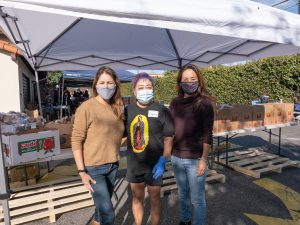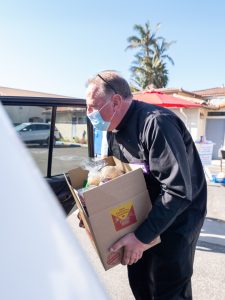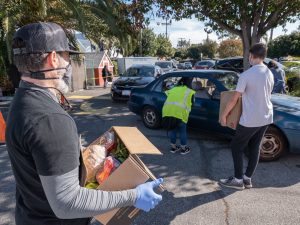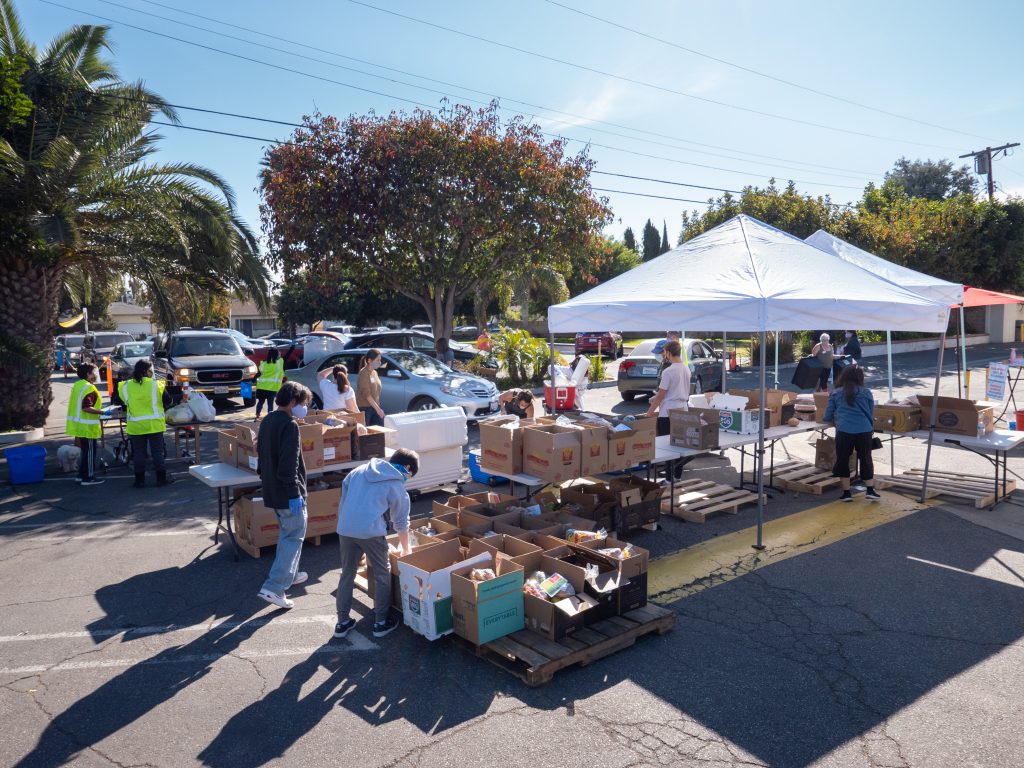In the days of “safer at home” and social distancing, the corner of Lincoln Boulevard and Garfield Avenue might be the busiest spot in Venice on Saturday mornings.
From 11 a.m. to 1 p.m., some 200 cars make their way into the parking lot of St. Mark Church via a COVID-conscious drive-thru system. Waiting for them are volunteers in bright yellow safety vests and face masks with grocery bags carrying fresh fruit and vegetables, canned goods, milk, and bread.
The order is first come, first serve. No sign-up required, no questions asked.
Organizers said 6,000 pounds of food are served here every week, although they’re not really sure how their small effort has gotten this big.
“This is all driven by God,” said Cookie Barthel, a St. Mark Church parish council member and parishioner since the 1980s, who coordinates the project with parishioners Miriam Galarza and Katty Rakfeldt. “We started this without knowing a food source. But God has provided everything we need.”

Certainly, the food drive’s success is at least partly thanks to a thriving partnership with Culver City nonprofit Nourish L.A. Parishioners and parents of the parish school, located one block west of the church on Coeur d’ Alene Avenue, have been a driving force behind the initiative.
Barthel lost her job managing a dental practice that was shut down during the pandemic and then sold. She said her motivation to push forward with the project — an extension of the parish’s “Loaves & Fishes Ministry” to families in need — came from her own experience of seeing how quickly people’s circumstances can change in a pandemic economy.
“I think if you’re a parent, not knowing where you’ll get food for your children has to be the most horrible feeling in the world,” Barthel told Angelus during a recent Saturday morning food drive. “That’s what we want to alleviate.”
For St. Mark’s administrator Father Albert van der Woerd, the project is a testimony to the good that can come out of a difficult year like 2020.
“Gratitude is the main feeling, but also wonder in how the Lord wanted this to happen,” said Father van der Woerd. “The right word here is ‘awe.’ You see how everyone is responding to that call.”
Originally from the Netherlands, the 60-year-old has only been a priest for four years. When he arrived at St. Mark’s last year, he could not have imagined that besides having to close his parish in a pandemic, he would also be spending time in negotiations over the development of a 40-unit supportive housing project for the chronically homeless on Lincoln Boulevard.

The issue centered around the proposed location of the taxpayer-funded project, known as the Lincoln Apartments, next to St. Mark’s parish center. Involved in the proposal was Safe Place for Youth (SPY), a nonprofit that currently works out of the location.
Parish families expressed safety and privacy concerns, since a private driveway behind the complex provides access to the church parking lot, used often by parents and children for the school, and now, for the Saturday food drives.
After months of discussion between developers, lawyers, local citizen groups — often in the public forum — the archdiocese and developers reached an agreement that addressed the concerns raised. The project got final approval in September.
“Thankfully, we were able to come together to a mutual commitment for the safety of children,” Father van der Woerd said.
From a church that has some 1,500 registered families and 300 children at the school, parishioners Geoff and Michelle Forgione have a second-grader and another starting transitional kindergarten at St. Mark. The Forgiones, living in nearby Mar Vista, were among some 200 families that wrote personal letters to LA City Councilman Mike Bonin to express concerns.
Geoff, who recently joined the parish council, said he admired how Father van der Woerd navigated criticism by sticking to his principled approach.
“Father Albert really did his homework and did a lot of listening to a lot of people,” said Geoff, an attorney by trade. “There was a concerted campaign to undermine him and compel him to change course. To his credit, he fought through it in a very dignified and determined way, and in the end we extracted significant concessions from the developers in the interest of child safety.”
Among the St. Mark parents working the food distribution line was Steve Wallace, wearing a bright yellow vest handing out bags as cars made their way up.
“The [Lincoln Project] is all in the future, and we want to protect our future,” he said. “But the important thing now is we have this. All the people working here today need to be safe. This is a very safe environment and [Father van der Woerd] has a fantastic program going on.”

Father van der Woerd expects parishioners to continue helping with volunteer projects related to the SPY program. The parish hall kitchen, for example, was recently upgraded to better serve SPY meal-service projects.
For the Saturday morning grocery distribution program, representatives of SPY donated two industrial refrigerators to facilitate storage of fresh food. SPY also helped St. Mark find contacts to help supply groceries.
Barthel, Galarza, and Rakfeldt — who Father van der Woerd calls the project’s “founding mothers” — asked the priest for access to a garage behind the parish office. He did and donated much of the contents to the St. Vincent de Paul Society. Since a second garage was needed as well, both were upgraded with three new electrical circuits to handle the refrigeration food storage.
“Too many are struggling now,” said Rakfeldt, a St. Mark parishioner for the last 20 years with an eighth-grade daughter at the school. “We’ll do this as long as we keep getting food, and we are finding there is no shortage of food.”
Galarza, whose social media marketing push has helped get the word out, said she sees a community coming together like never before.
“People who six to eight months ago may have been OK are now in trouble. There is no shame in coming here and asking for food. And those who may feel isolated and have nothing to do, they are coming out to serve.”
“We started small and every week we see this grow and inspire other people to help,” she added.
Looking out at the line of cars varying from family vans to Teslas waiting for food, Barthel repeated a reminder to the volunteers.
“We don’t know their story. It’s not for us to judge. How we give is what matters. How they receive is up to them.”

